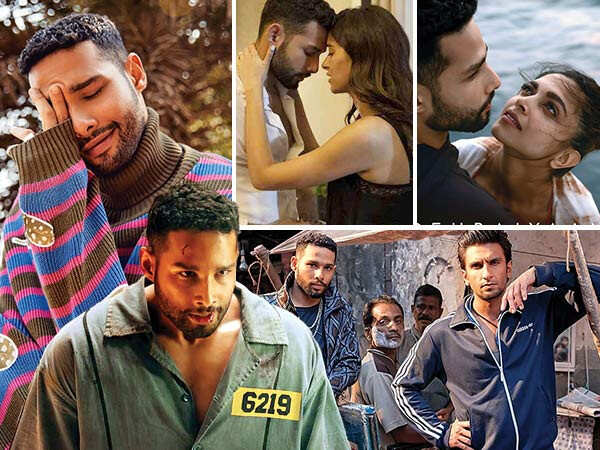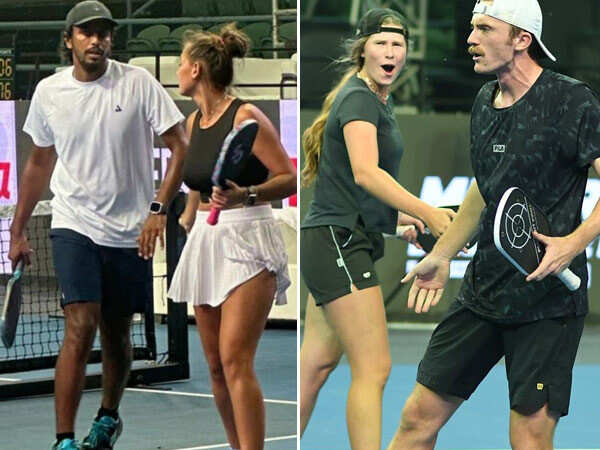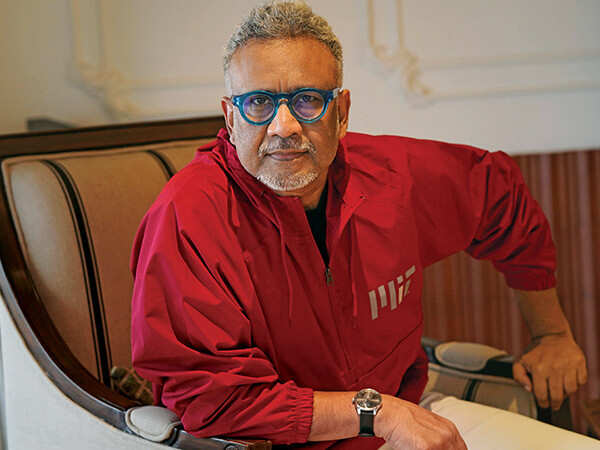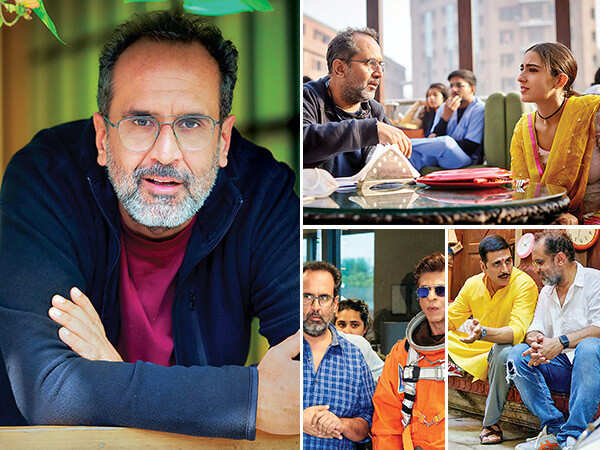Exclusive: Siddhant Chaturvedi on his film choices family and more
11 min read
My interview with Siddhant Chaturvedi is a hugely emotional affair. He breaks down while talking about his parents and how they supported him during his initial days. My eyes well up listening to the tumultuous outpouring
of emotions. Then, realising that things are getting too heavy, he shifts gears and starts joking around, making the
ambience light again. The talk becomes more sedate when he starts talking about relationships. He goes on to describe how awkward he felt during the intimacy workshop with Deepika Padukone. He describes himself as raw, awkward, shy and vulnerable. Quite unlike the macho image we have of him. He speaks candidly and lets it all out. The interview is a sort of catharsis for him. Listening to him, recording his sentiments, makes my own heart weigh
a little lighter.
Excerpts:
In Kho Gaye Hum Kahan, what really intrigued me was the topic of child abuse. Did you do any kind of research on it for your role?
It was a sensitive topic to deal with and could have gone the other way. I had no reference point to play someone like that.
You didn’t research it?
Director Arjun Varain Singh and I spent a month meeting therapists and survivors to understand the impact of deep-rooted trauma and how it shapes one’s behaviour and childhood. I had to deeply empathise with the subject, which made me uneasy but essential for my performance. The final take you saw was spontaneous; Arjun gave me freedom to express the emotions naturally, which led to genuine tears on screen. We worked closely with Zoya on crafting the monologue to convey the protagonist’s long-held pain in a sincere, non-preachy way. The audience’s connection and feedback were overwhelming after the film’s release. After the release I got so many messages.
From men?
Men from around the world reached out, expressing how the film resonated with their own experiences and thanked us for giving voice to something rarely discussed. It’s a shame that such important topics are often ignored. Men do not talk about abuse at all. Nor do they invest in mental health. I’ve reached a point where life feels like a daily celebration at home. My parents are proud and happy and I find my own happiness and peace through them and my friends. However, reflecting on the journey, I realise that the toughest period was the five or six years of daily rejection. Leaving a stable career as a chartered accountant to pursue my dreams brought uncertainty and hardship I hadn’t anticipated. Once I achieved my goals, I was so focused on the success that I ignored the emotional baggage of rejection and frustration. Now that things are going well, these suppressed feelings are resurfacing. My past frustrations, anger and shame are leaking into my current relationships and my daily life. This realisation has made me more aware of the importance of mental health. Achieving success doesn’t erase past scars; they need healing. To address this, I talk openly with my parents and brother. I also write as a form of expression.
Parents are always the naysayers when their child tells them he wants to pursue acting. But your father always supported you. Is it because he’s an avid movie buff himself?
Yes, he’s a complete movie buff. He used to buy Mayapuri, which published stars’ addresses. He would write letters to them. In Ballia, films arrived a year or two late and they couldn’t afford tickets, so they would peep through a hole to watch parts of movies over the course of a week. For him, my CA career was a safety net because we were too ashamed to voice our true dreams. Even after the success of Inside Edge, my father never told our friends or neighbours that I’ve taken up acting as my career. It wasn’t until the success of Gully Boy that he finally acknowledged my achievements.
What was your breakout moment?
I loved Gully Boy. I felt a strong connection to the character, which made me decide to take a leap of faith. I knew this would lead to more work.But I wasn’t involved in promotions or the Berlin event. I stayed home, tracking everything from afar and saw the positive feedback through clips in my family WhatsApp group. That year was challenging as I felt stuck and unable to move forward or backward.
We’ve heard that the screening of the film was an emotional moment for you…
I remember the screening of Gully Boy was in Juhu PVR. Alia entered the elevator with us. And she was like, “Your life is going to change. You know that?” I was like, “I don’t know.” She’s like, “Yeah, it will.” I took my parents to the cast and crew screening as I felt I would be more comfortable there among friends. And I wasn’t able to watch the film. Because every time I turned around, I could see my parents were getting emotional. My dad was openly crying. I couldn’t concentrate on what was happening on the screen. My dad has watched that film 25 times in different theatres. But I haven’t watched Gully Boy. I couldn’t watch it. Because everytime I start watching it, all I can see before my eyes are the tear-laden faces of my parents.
So every time you do a good film, you won’t watch it?
I watch all my bad films and enjoy them, even if they don’t work. For example, I watched Phone Bhooth and loved it, thinking, “What’s the problem? It’s actually pretty good.”
A story goes that once you threw a tantrum and your grandfather bought you a horse.
My dadaji used to pamper me, and we lived in a big house surrounded by open fields. When my dad got a job in Mumbai, we moved to a small one-BHK rented space, which felt overwhelming and confusing. I struggled with the displacement and took a long time to adjust. Back in Ballia, I was expressive, naughty and fun-loving. But in Mumbai, I became silent, as the city culture was very different.
I only spoke Bhojpuri and couldn’t communicate in Hindi or English when
I started at Pink Rose Senior KG in Mumbai.
I didn’t even know basic things like where to go to the bathroom, as I was used to peeing in open fields. Overwhelmed, I ran back to my village after a year because I missed my grandparents and couldn’t cope. My parents then enrolled me in a local school but I struggled without my mom. Despite the challenges, I know my grandfather, who has since passed away, would be proud of how far I’ve come, and I believe all my parents’ efforts were worthwhile.
So you’re a writer, actor, poet, singer. Do you channelise all your angst and anger, pain into your singing?
English was a late addition to my life until 12th grade. And I wasn’t as proficient as those around me, which made me self-conscious. However, I eventually improved my English to the point where I could hold conversations.
I wasn’t involved in acting until I was 15, and things evolved quickly from there. Watching films helped, and I picked up the guitar to impress a girl whose favourite song was The Scientist by Coldplay.
I learnt it in four days to play for her birthday, which sparked my interest in singing and songwriting. Although I’m a better rapper, I began writing poetry and turning it into lyrics with the help of musician friends. Writing became a therapeutic outlet for me. I also paint, often depicting horses, childhood memories, or scenes from my village.
I paint when I feel lonely. Dancing helps me express my emotions, as I prefer not to keep feelings bottled up. I’m transparent with my loved ones, especially my mom. I channel my remaining emotions into creative outlets.
Do you find people trying to curb your natural spirit?
No, people have been very kind to me. From Karan Anshuman on Inside Edge to producers Ritesh Sidhwani, Karan Johar and Adi Sir, everyone has been supportive and respectful. I truly appreciate their support. And you’ve been great too. My first Filmfare in Assam, was incredibly special to me.
Tell us about it.
My dad still talks about that Filmfare event. It was the first time I took my parents to an award show. He remembers everything: the custom-made suit, my mom’s Banarasi saree and how we all coordinated. It’s a cherished memory for him. We were on the same flight as other attendees and stayed at a hotel where he met industry figures like Ramesh Taurani and Ramesh Sippy. For him, it was a memorable experience. Years ago, when we attended a Filmfare event, we were seated far from the stage and couldn’t see much, which embarrassed my dad. This time, sitting in the second row, we were warmly greeted by stars like Varun (Dhawan), Alia (Bhatt), Ranveer (Singh) and Ayushmann (Khurrana). Their kindness and respect for my parents made the event even more special. Afterwards, we relaxed at the hotel, where my dad enjoyed breakfast with my industry friends. The entire trip was unforgettable, and the photo of my mom holding the Filmfare trophy remains a cherished memory.
You’ve got a close knit of friends. So are stable friendships possible, especially when you’re vying for the same kind
of roles?
I’ve only experienced true authenticity in friendship a few times. For instance, Shakun Batra, Arjun, Zoya and Farhan are close friends. We often connect, whether it’s playing cricket or meeting up. Adarsh Gourav is an exception, as we bonded during auditions where we swapped roles—he auditioned for MC Sher and I for White Tiger. We’ve worked together and kept in touch regularly. He’s now making waves in Hollywood, which makes me happy for him. Ishaan Khatter is another friend who keeps things chill. He even broke the news to me about my film being called Dhadak 2. We have a good rapport, and I share a similar connection with Ananya (Panday), where we always wish each other well. Her mom and my mom even bonded like old friends after Kho Gaye Hum Kahan.
When you did Gehraiyaan, there was a lot of kissing and all of that body play…
I was initially unsure how to handle intimate scenes. When Shakun told me about it, I thought it was just holding hands. However, he explained that in his film, “intimacy” involves more than that and requires a specific approach to ensure both actors are comfortable. He suggested a workshop to break the barrier and make sure both parties felt safe. So, I went to Anahita Adajania’’s place for a screen test with Deepika Padukone. The director left us alone with the camera, and I felt awkward and shy, struggling to be romantic and intimate on camera. I didn’t feel confident and ended up bombing the test. Shakun called me again but I was still unsure. I didn’t have the cultural reference for these scenes and felt overwhelmed. My father advised me to push through, emphasising that most people in India would jump at the chance. He encouraged me to be professional, redefine what’s possible and seize this opportunity with Dharma Productions, Deepika and Shakun Batra.
You’d obviously have been intimate with a woman before that in your personal life. So what was the problem?
I’m shy because I’ve never made the first move, so I struggle with it. Karan (Johar) called me out on it, telling me to be a professional and just do it. That’s why we had to extend the intimacy workshop from a week to a month. It was challenging because Deepika Padukone is not only extremely beautiful but also she’s Ranveer Singh’s wife, whom I’m very close with, and this added to the pressure. Over the month, we did trust exercises and bonded. Despite initially laughing at my discomfort, Deepika was very understanding and supportive. Eventually, we became good friends and the process felt like learning a dance routine.
How did your relatives react to your intimate scenes?
People felt that even though I’m an actor, I was living out their dreams instead of my own. My uncle couldn’t say much—he just smiled and blushed. For a year, they looked at me with smiles, never directly addressing it. When my parents and I watched the film together, I sat separately from them. Afterward, I asked my dad for his opinion. He said, “The performance was good but it felt like too much.” Despite this, he liked the film and appreciated it overall.
What are the red flags in a relationship?
Relationships, till now, for me, are not transactional. There’s nothing which I want to negotiate. I give it my all. To an extent where I become the red flag.
You are a red flag?
I don’t know. Till now, the experiences I’ve had, the things that have happened in my life, make me feel like I’m the red flag. People have handed me the red flag and left. “Forgive me. It won’t happen.”
Are you obsessive? Are you passionate?
No, it’s not like that. I’m passionate not obsessive or possessive. I have clear priorities and ambitions, which require sacrifices. Achieving my goals means giving up certain things, and while I strive to balance everything, some challenges persist. Despite this, the people I’ve been with have been wonderful.
Why didn’t the relationships work out?
The first relationship didn’t work out because I was 19, focused on my CA studies and deeply in love. We dated for three years and planned to marry.But when I decided to pursue acting, she couldn’t accept that change. She wanted marriage soon and I couldn’t give her that. I chose my career, promising to make it worth it. Now she’s married and happy, just like I am. It feels like a La La Land ending. The second relationship happened while I was shooting Gully Boy. My mental state was challenging, and when the film finally came out, adjusting to the sudden change was hard for both me and my partner. She struggled to understand the whirlwind of my life, which led to the relationship fizzling out. We’ll see what the future holds.
No marriage on the cards?
Not right now. I was all for it when I was 19.
What advice would you give a 20-year-old Siddhant?
I don’t know that guy anymore—it’s almost like a time paradox. Changing even a small detail or passing on a message would alter everything, including my presence here. He did everything right, so there’s nothing to change. In fact, I’d want his advice now because my faith and perspective on life have shifted. At 30, I view life very differently than I did back then.Siddhant Chaturvedi lays bare his emotions to Jitesh Pillaai. Continue reading …Read More



